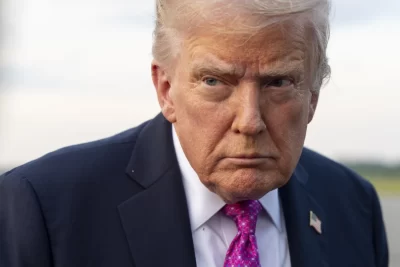
DETROIT — If Donald Trump makes good on his threat to slap 25% tariffs on everything imported from Mexico and Canada, the price increases that could follow will collide with his campaign promise to give American families a break from inflation.
Economists say companies would have little choice but to pass along the added costs, dramatically raising prices for food, clothing, automobiles, booze and other goods.
The president-elect floated the tariff idea, including additional 10% taxes on goods from China, as a way to force the countries to halt the flow of illegal immigrants and drugs into the U.S. But his posts Monday on Truth Social threatening the tariffs on his first day in office could just be a negotiating ploy to get the countries to change behavior.
High food prices were a major issue in voters picking Trump over Vice President Kamala Harris, but tariffs almost certainly would push those costs up even further.
For instance, the Produce Distributors Association, a Washington trade group, said Tuesday that tariffs will raise prices for fresh fruit and vegetables and hurt U.S. farmers when other countries retaliate.
“Tariffs distort the marketplace and will raise prices along the supply chain, resulting in the consumer paying more at the checkout line,” said Alan Siger, association president.
Mexico and Canada are two of the biggest exporters of fresh fruit and vegetables to the U.S. In 2022, Mexico supplied 51% of fresh fruit and 69% of fresh vegetables imported by value into the U.S., while Canada supplied 2% of fresh fruit and 20% of fresh vegetables.
Before the election, about 7 in 10 voters said they were very concerned about the cost of food, according to AP VoteCast, a survey of more than 120,000 voters.
“We’ll get them down,” Trump told shoppers during a September visit to a Pennsylvania grocery store.
The U.S. is the largest importer of goods in the world, with Mexico, China and Canada its top three suppliers, according to the most recent U.S. Census data.
People looking to buy a new vehicle likely would see big price increases as well, at a time when costs have gone up so much they are out of reach for many. The average price of a new vehicle now runs around $48,000.
About 15% of the 15.6 million new vehicles sold in the U.S. last year came from Mexico, while 8% crossed the border from Canada, according to Global Data.
Much of the tariffs would get passed along to consumers, unless automakers can somehow quickly find productivity improvements to offset them, said C.J. Finn, U.S. automotive sector leader for PwC. That means even more consumers “would potentially get priced out,” Finn said.
Hardest hit would be Volkswagen, Stellantis, General Motors and Ford, Bernstein analyst Daniel Roeska wrote Tuesday in a note to investors. “A 25% tariff on Mexico and Canada would severely cripple the U.S. auto industry,” he said.
The tariffs would hurt U.S. industrial production so much that “we expect this is unlikely to happen in practice,” Roeska said.
The tariff threat hit auto stocks on Tuesday, particularly shares of GM, which imports about 30% of the vehicles it sells in the U.S. from Canada and Mexico, and Stellantis, which imports about 40% from the two countries. For both, about 55% of their lucrative pickup trucks come from Mexico and Canada. GM stock lost almost 9% of its value, while Stellantis dropped nearly 6%.
It’s not clear how long the tariffs would last if implemented, but they could force auto executives to move production to the U.S., which could create more jobs in the long run. However, Morningstar analyst David Whiston said automakers probably won’t make any immediate moves because they can’t quickly change where they build vehicles.
Millions of dollars worth of auto parts flow across the borders with Mexico and Canada, and that could raise prices for already costly automobile repairs, Finn said.
The Distilled Spirits Council of the U.S. said tariffs on tequila or Canadian whisky won’t boost American jobs because they are distinctive products that can only be made in their country of origin. In 2023, the U.S. imported $4.6 billion worth of tequila and $108 million worth of mezcal from Mexico and $537 million worth of spirits from Canada, it said.




